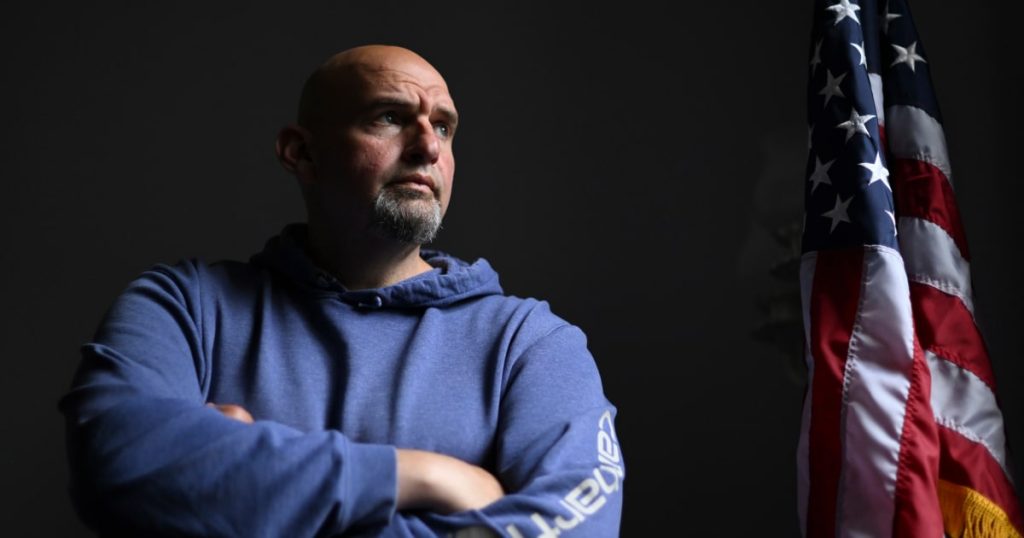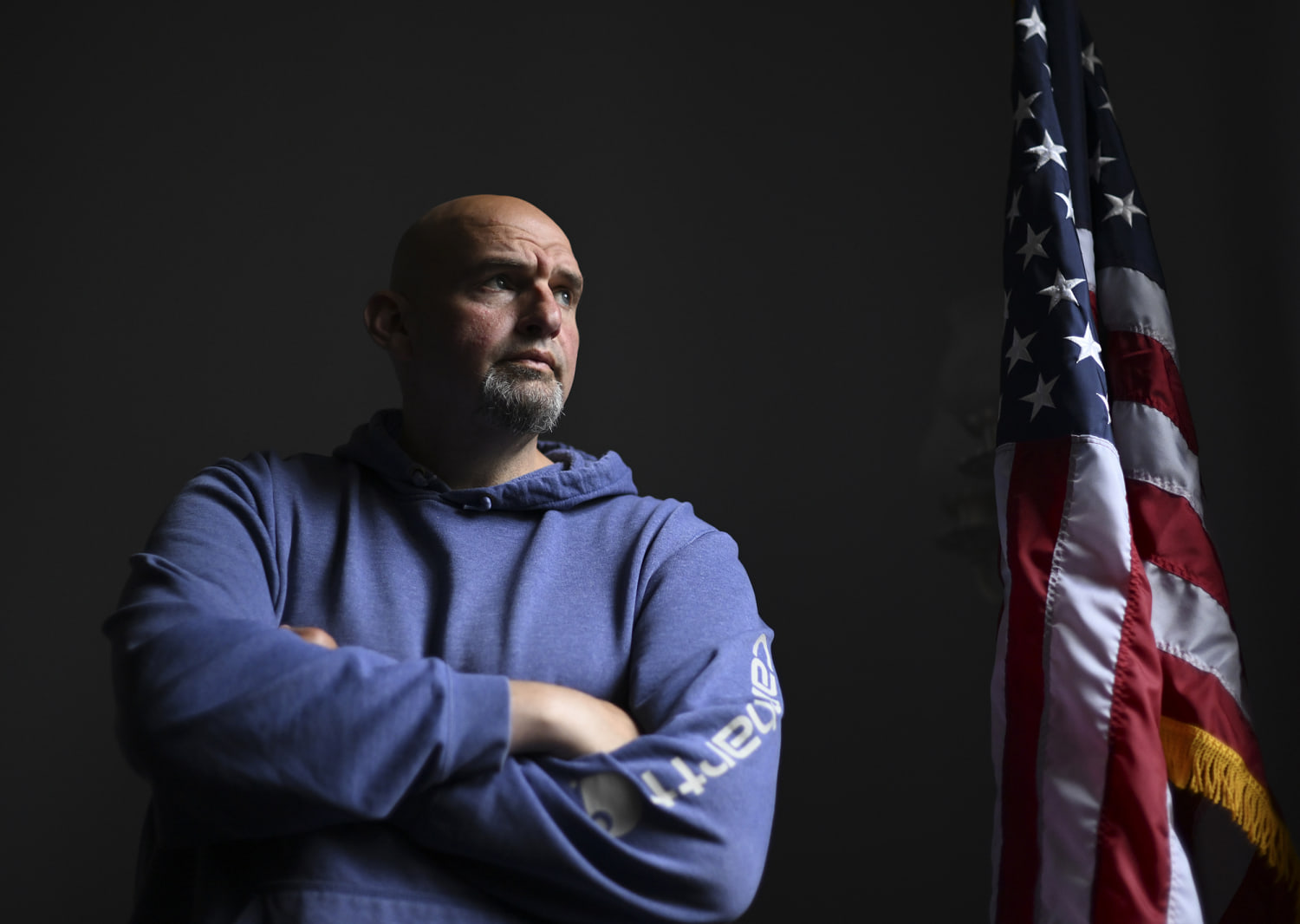

Sen. John Fetterman, D-Pa., said in candid remarks about his struggles with depression that he feared seeking treatment would be the end of his political career.
In an exclusive interview with NBC News’ “Meet the Press,” the first term senator, who was discharged in March from inpatient treatment for clinical depression, recalled a “very dark” moment in December 2022 when he was unable to get out of bed while “dreading” his Senate swearing-in ceremony on Jan. 3.
“People hear all their lives about ‘I can’t get out of bed,’ and you really can’t understand what that really means. You can’t get out of bed until it happens to you. And it did,” he told moderator Kristen Welker.
“And I was scaring my children, and they were confused,” he added. “And, of course, my wife was concerned, and I think she understands better than the kids did.”
Asked how he was feeling compared to a year ago, before he sought treatment for depression, Fetterman said that “things are so much different” now.
“The line [is] ‘I’m living my best life,’ and I really am, because I just am so grateful,” he said. “And I’m always talking about mental health, because I want everybody that can hear that is that help works, and you should get help. And please, don’t suffer any longer, because you deserve to be better. And I’m so grateful to do that, and I’m paying it forward by talking about it.”
Fetterman was discharged March 31 from Walter Reed National Military Medical Center in Washington, where he had been receiving treatment for clinical depression. He checked himself in for treatment on Feb. 15, with staff members citing a mental health battle that they said intensified during his recovery from a stroke he suffered on the campaign trail in May 2022.
On “Meet the Press,” Fetterman recalled being under a lot of pressure and stress at the start of 2021, when he launched his Senate campaign. He described his experience with depression as “kind of like a slow burn, how it kept going along, along, along.”
“And then, after the stroke hit, then I was on the other side, and it was a different kind of a challenge, because I knew that everything and anything is going to be weaponized by the other side,” he said.
Fetterman, who is often seen using an instant transcription app on his phone while speaking to reporters, said having a “basic, simple conversation” or participating in events such as interviews after the stroke became more challenging, causing his depression to “continue to grow and deepen.”
After he won the Senate race in 2022, he said, his depression “accelerated and got worse.”
“And I really scared my kids, and they thought: ‘You won, Dad. Why aren’t we enough? Why are you still so sad? Why are you even more sad?’ And it was hard to explain why I was. And, of course, a 9-year-old child wouldn’t understand that,” he said. “And it was awful, and that’s when it continued to get more and more intense.”
Fetterman said he knew he needed to seek treatment when he began having thoughts of harming himself.
Asked how worried he was at the time about sharing what he was experiencing, Fetterman said he assumed that going public with the inpatient treatment “would be the end of my career.”
Fetterman said he was “walled off” during his time at Walter Reed, including having no access to TV or the internet or contact with his family. But he said he experienced a “watershed moment” when his children visited him for the first time.
“I was overwhelmed that they embraced me and they were so happy to see me,” he said. “It was like a breakthrough.”
Fetterman said he was unsure whether his children should visit him in the hospital after they had seen him during his hospitalization following his stroke. But he said it was the right decision.
“It just created a kind of environment that was blowing open, being able to see the light at the end of the tunnel,” he said. “And that gave me another reason to fully engage and to trust the process.”
Fetterman then began engaging more with family members and his staff, he said, and “slowly discovering that people have been supportive and that I do have a career to go back into.”
Fetterman said he was in awe when the lead doctor at Walter Reed told him that his “depression is in remission,” because he initially had no idea how long he would be there.
“That was the second part of the one-two punch that really allowed me to fully just get together and realize that I do have a life to come back to,” he said.
Fetterman said people have come up to him and thanked him for sharing his story. He also expressed gratitude for his Democratic and Republican colleagues in the Senate, all of whom he said have been “supportive” and haven’t attacked him for his battle with mental health.
Fetterman has faced public criticism from Senate GOP colleagues, but not over his inpatient treatment. In September, some Republicans mocked changes to the chamber’s dress code that allowed Fetterman to wear his signature hoodie and shorts on the Senate floor.
More recently, he sparked backlash on the other side of the aisle, with some progressives decrying his staunch support of Israel and tougher immigration laws. In a separate interview this month, he declared: “I’m not a progressive.”
As a member of the bipartisan Senate Mental Health Caucus, which formed in October, Fetterman said he hopes to “expand the awareness and embrace” of mental health struggles and to lessen the stigma of seeking help.
“And I would say to the biggest skeptic in the world: ‘I was that person. Oh, it’s not going to work. It’s not going to change. This is how I’ve always been,’” he said. “But I was wrong. And it does work. And if it can work for me — because I was absolutely convinced that there is no coming back — then that means, I think, it would be applicable to 99% of people out there that could hear this.”
Asked by Welker why it’s important to be honest with the American public about his health journey over the past year, Fetterman replied: “It’s a risk that I wanted to take because I wanted to help people and know that I don’t want them to suffer or put any kinds of despair that I’ve been in.
“And if that conversation helps, then I’m going to continue to do that,” he said.

 Latest Breaking News Online News Portal
Latest Breaking News Online News Portal




